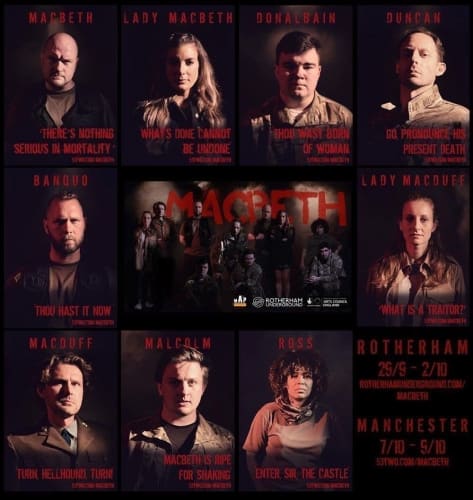This version of Shakespeare’s tragedy was actually designed as an outdoor promenade production. Visually, it translates well into a conventional theatrical setting with rough tree bark scattered around the stage, army style tents and burning torches retaining much of the ‘outdoor’ environment. The move does, however, place constraints on the production—the car crashes and explosions mentioned on the Internet are obviously absent—and draws attention to flaws that might otherwise have been overlooked.
This is the first time that Manchester Actors’ Platform (working on this occasion with Rotherham Underground) has tackled a Shakespeare play and a certain lack of experience is apparent in the speaking of the verse. Cast members struggle with the tongue-twisting nature of the speeches and do not always adjust the volume of their voices for the inside venue.
Director Alice Bartlet aims to make the production relevant to a contemporary audience accustomed to reports of the brutality of war. Yet although we are told the play takes place in a near-future UK that has descended into civil war after Brexit, no political points are made. The concept does, however, justify modern day dress and the use of camouflage to disguise soldiers as Birnam Wood.
This version of the play substitutes the trauma of war for the horror of the supernatural; scenes featuring the ‘Weyard Sisters’ are trimmed (although there is a hint that Lady Macbeth (Alexandra Maxwell) may also be a practitioner of the dark arts). However, limiting the supernatural elements sacrifices the atmosphere of malevolence without which the production feels less compelling than one might hope. It is possible that the outdoor production—with natural darkness and greater opportunity for explosions to bring out the carnage of war—may have compensated for this lack.
Concentrating on the conflict arising from war limits the fascinating ambiguity of the text. Simon Naylor’s Macbeth is a soldier accustomed to doing what has to be done no matter how unpalatable. He shows a professional soldier’s contempt for the princes who block his way to the throne and is straightforward in his plotting. Such an approach may be appropriate to a wartime setting but is dramatically less interesting than a character tormented by his increasing corruption. Naylor seems to be almost enjoying articulating his plans rather than fearing damnation and it is only in subtle gestures—an inability to look directly at the other characters and an increasing terseness in speech—that his doubts become apparent.
As Macbeth seems to need little prompting towards murder, Lady Macbeth becomes the brains behind the brawn: refining plans rather than hatching them. It is an approach that links well with Naylor’s raw performance. Alexandra Maxwell carries the emotional burden of the play descending from a stylish trophy wife to someone dependent upon alcohol to get through the day.
It is hard to avoid the feeling that this production might have worked better in the original outdoor format but it is engaging enough to make one look forward to the next time MAP and Rotherham Underground tackle Shakespeare.

